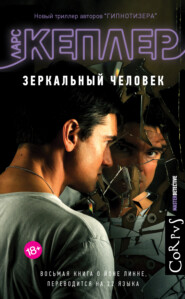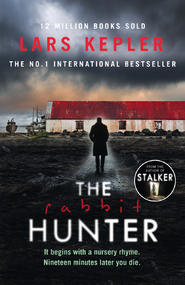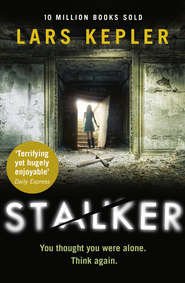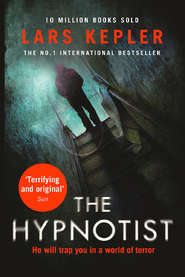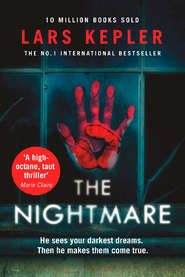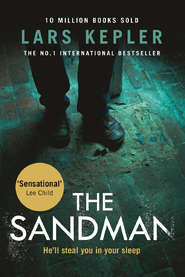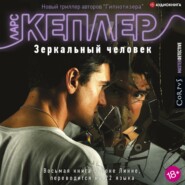По всем вопросам обращайтесь на: info@litportal.ru
(©) 2003-2024.
✖
Cop Killer
Автор
Год написания книги
2019
Настройки чтения
Размер шрифта
Высота строк
Поля
Death is never very pretty. In addition, she had never been pretty during her lifetime, not even when she was young.
Lying there in the forest undergrowth, she was, at best, pathetic.
He waited a minute or so until his breathing had returned to normal and his heart had stopped racing.
And then he was himself again, calm and rational.
Beyond the pile of logs was a tangle of fallen branches from the big autumn storm of 1968, and beyond that, a dense planting of spruce trees about the height of a man.
He lifted her under the arms and was disgusted by the feel of the sticky, damp stubble in her armpits against the palms of his hands.
It took some time to drag her through the almost impassable terrain of sprawling tree trunks and uptorn roots, but he saw no need to hurry. Several yards into the spruce thicket there was a marshy depression filled with muddy yellow water. He shoved her into it and tramped her limp body down into the ooze. But first he looked at her for a moment. She was still tanned from the sunny summer, but the skin on her left breast was pale and flecked with light-brown spots. As pale as death, one might say.
He walked back to get the green coat and wondered for a moment what he should do with her handbag. Then he took the blouse from the timber pile, wrapped it around the handbag, and carried everything back to the muddy pool. The colour of the coat was rather striking, so he picked a suitable stick and pushed the coat, the blouse, and the handbag as deep as he could down into the mud.
He spent the next quarter of an hour collecting spruce branches and chunks of moss. He covered the pool so thoroughly that no casual passerby would ever notice the mudhole existed.
He studied the result for a few minutes and made several corrections before he was satisfied.
Then he shrugged his shoulders and went back to where he was parked. He took a clean cotton rag from the floor and cleaned off his rubber boots. When he was done, he threw the rag on the ground. It lay there wet and muddy and clearly visible, but it didn't matter. A cotton rag can be anywhere. It proves nothing and can't be linked to anything in particular.
Then he turned the car around and drove away.
As he drove, it occurred to him that everything had gone well, and that she had got precisely what she deserved.
2 (#ulink_40014f3a-0a10-56e2-9898-1d1f59d00e87)
A car stood parked outside a block of flats on Råsundavägen in Solna. It was a black Chrysler with white wings and the word POLICE in big, white, block letters on the doors, bonnet, and boot. Someone who had wanted to describe the vehicle's occupants even more exactly had used tape on the black-on-white licence plate to cover the lower loop of the B in the first three letters, BIG.
The headlights and interior lights were turned off, but the glow from the streetlights glistened dully on shiny uniform buttons and white shoulder belts in the front seat.
Even though it was only 8.30 on a pretty, starlit, not especially chilly October evening, the long street was from time to time utterly deserted. There were lights in the windows of the blocks of flats on either side, and from some of them came the cold blue glow of a TV screen.
An occasional passerby glanced curiously at the police car but lost interest quickly when its presence did not seem to be connected with any noticeable activity. The only thing to be seen was two ordinary policemen sitting lazily in their vehicle.
The men inside the car would not have objected to a little activity either. They had been sitting there over an hour, and all that time their attention had been fixed on a doorway across the street and on a lit window on the first floor to the right of the doorway. But they knew how to wait. They had had lots of experience.
It might have occurred to anyone taking a closer look that these two men didn't really look like ordinary police constables. There was nothing wrong with their uniforms, which were entirely regulation and included shoulder belts and truncheons and pistols in holsters. What was wrong was that the driver, a corpulent man with a jovial mien and alert eyes, and his companion, thinner and slouching a bit, with one shoulder against the side window, both looked to be about fifty years old. As a rule, patrol cars are manned by young men in good physical condition, and where exceptions to this rule occur, the older man is usually paired with a younger companion.
A patrol car crew whose combined ages exceeded one hundred years, as in this case, had to be regarded as a unique phenomenon. But there was an explanation.
The men in the black-and-white Chrysler were merely masquerading as patrolmen. And concealed behind this clever disguise were none other than the chief of the National Murder Squad, Martin Beck, and his closest colleague, Lennart Kollberg.
The disguise had been Kollberg's idea, and was based on his knowledge of the man they were out to try and capture. The man's name was Lindberg, known as The Breadman, and he was a thief. Burglary was his speciality, but he also committed an occasional armed robbery and had even tried his hand at fraud, with less fortunate results. He had spent many years of his life behind bars but was a free man at the moment, having completed his most recent sentence. A freedom that would be short-lived if Martin Beck and Kollberg were successful.
Three weeks earlier, The Breadman had stepped into a jeweller's in the centre of Uppsala, drawn a revolver, and forced the owner to hand over gems, watches, and cash to a combined value of nearly 200,000 kronor. Up to this point, that was all comparatively well and good, and The Breadman could have taken his haul and vanished, except for the fact that a sales assistant suddenly appeared from the inner reaches of the shop, and The Breadman panicked and let fly a bullet that struck the woman in the forehead and killed her on the spot. The Breadman managed to make his escape, and two hours later, when the Stockholm police went to look for him at his girlfriend's flat at Midsommarkransen, they found him in bed. His fiancée maintained that he had a cold and had not left the house in twenty-four hours, and a search produced nothing in the form of rings, jewels, watches, or money. The Breadman was taken in for questioning and confronted with the owner of the shop, who was reluctant to make a positive identification because the robber had worn a mask. But the police felt no such reluctance. In the first place, they could assume that The Breadman was broke after his long stay in prison, in addition to which an informer had told them that The Breadman had mentioned a job he was planning ‘in another city’, and in the second place, there was a witness who, two days before the crime, had seen The Breadman strolling down the street where the jeweller's was located, presumably to reconnoitre. The Breadman denied ever having been in Uppsala and finally had to be released for lack of evidence.
For three weeks now, the police had had The Breadman under constant surveillance, convinced that sooner or later he would visit the place where he had hidden the loot from the holdup. But The Breadman seemed to realize he was being shadowed. On a couple of occasions he had even waved to the plainclothes officers who were watching him, and his single purpose seemed to be to keep them occupied. He clearly had no money. At least he spent none, since his girlfriend had a job and provided him with food and shelter over and above the routine assistance he picked up at the social security office once a week.
In the end, Martin Beck decided to attend to the matter himself, and Kollberg hit on the brilliant idea of dressing themselves up as beat constables. Since The Breadman could spot the most plainly clothed plainclothes officer at a great distance but had always taken a contemptuous and nonchalant attitude towards uniformed personnel, the uniform, in this case, ought to be the best disguise. Such was Kollberg's reasoning, and Martin Beck, with some reservations, agreed with him.
Neither one of them had hoped for any immediate result of this new tactic, and they were pleasantly surprised when The Breadman jumped into a taxi as soon as he realized he was no longer being watched and had himself brought to this address on Råsundavägen. The very fact that he had taken a cab seemed to indicate a certain purposefulness, and they were convinced that something was up. If they could collar him with the stolen goods and maybe even the murder weapon in his possession, that would definitely link him to the crime, and the case would be closed as far as they were concerned.
The Breadman had now been in the building for an hour and a half. They had had a glimpse of him in the window to the right of the doorway an hour earlier, but nothing had happened since then.
Kollberg was starting to get hungry. He was often hungry, and he often talked about losing weight. Every now and then he would go on some new diet, but he generally gave up pretty quickly. He was at least three stone overweight, but he worked out regularly and was in good physical condition. When occasion demanded, he was astonishingly quick and lithe for the size of his body and his age, which was nearly fifty.
‘It's a hell of a long time since I had anything in my belly,’ Kollberg said.
Martin Beck didn't answer. He wasn't hungry, but he had a sudden longing for a cigarette. He had pretty much stopped smoking two years before, after a serious gunshot wound in the chest.
‘A man my size really needs a little more than one hard-boiled egg a day,’ Kollberg went on.
If you didn't eat so much you wouldn't be that size and you wouldn't need to eat so much, Martin Beck thought, but he said nothing. Kollberg was his best friend, and it was a touchy subject. He didn't want to hurt his feelings and he knew Kollberg was in an especially bad mood whenever he was hungry. He also knew that Kollberg had urged his wife to keep him on a reducing diet that consisted exclusively of hard-boiled eggs. The diet was not a great success, however, since breakfast was the only meal he ate at home. He ate his other meals out, or at the police canteen, and they did not consist of hard-boiled eggs – Martin Beck could vouch for that.
Kollberg nodded in the direction of a brightly lit pastry shop half a block away.
‘I don't suppose you'd …’
Martin Beck opened the door on the kerb side and put out one foot.
‘Okay. What do you want? Danish?’
‘Yes, and a mazarin,’ Kollberg said.
Martin Beck came back with a bag of pastries, and they sat quietly and watched the building where The Breadman was while Kollberg ate, dribbling crumbs all over his uniform. When he was finished eating, he pushed the seat back one more notch and loosened his shoulder belt.
‘What have you got in that holster?’ Martin Beck asked.
Kollberg unbuttoned the holster and handed him the weapon. It was a toy pistol of Italian manufacture, well made and massive and almost as heavy as Martin Beck's own Walther, but incapable of firing anything but caps.
‘Nice,’ said Martin Beck. ‘Wish I'd had one like that when I was a kid.’
It was common knowledge on the force that Lennart Kollberg refused to carry arms. Most people were under the impression that his refusal was based on some kind of pacifist principles and that he wanted to set a good example, since he was the police department's most enthusiastic advocate of eliminating weapons altogether under normal circumstances.
And all of that was true, but it was only half the truth. Martin Beck was one of the few people who knew of the primary reason for Kollberg's stand.
Lennart Kollberg had once shot and killed a man. It had happened more than twenty years before, but Kollberg had never been able to forget, and it was a good many years now since he had carried a weapon, even on critical and dangerous assignments.
The incident took place in August 1952, while Kollberg was attached to the second Söder division in Stockholm. Late one evening, there was an alarm from Långholm Prison, where three armed men had attempted to free a prisoner and had shot and wounded one of the guards. By the time the emergency squad with Kollberg reached the prison, the men had smashed their car into a railing up on Väster Bridge while trying to get away, and one of the men had been captured. The other two had managed to escape by running into Långholm Park on the other side of the bridge abutment. Both of them were thought to be armed, and since Kollberg was considered a good shot, he was included in the group that was sent into the park to try and surround the men.
With his pistol in hand, he had climbed down towards the water and then followed the shore away from the glow of the lights up on the bridge, listening and peering into the darkness. After a while, he stopped on a smooth granite outcropping that projected out into the bay and bent over and dipped one hand in the water, which felt warm and soft. When he straightened up again, a shot rang out, and he felt the bullet graze the sleeve of his coat before it hit the water several yards behind him. The man who fired it had been somewhere in the darkness among the bushes on the slope above him. Kollberg immediately threw himself flat on his face and squirmed into the protective vegetation along the shore. Then he started to crawl up towards a boulder that loomed over the spot where he thought the shot had come from. And sure enough, when he reached the huge rock he could see the man outlined against the light, open water of the bay. He was only fifty or sixty feet away. He was turned halfway towards Kollberg, holding his pistol ready in his raised hand and moving his head slowly from side to side. Beside him was the steep slope down into Riddar Bay.
Kollberg aimed carefully for the man's right hand. Just as his finger squeezed off the shot, someone suddenly appeared behind his target and threw himself towards the man's arm and Kollberg's bullet and then just as suddenly vanished again down the hillside.
Kollberg did not immediately realize what had happened. The man started running, and Kollberg shot again and this time hit him in the knee. Then he walked over and looked down the hill.
Down at the edge of the water lay the man he had killed. A young policeman from his own division. They had often been on duty together and always got along unusually well.






